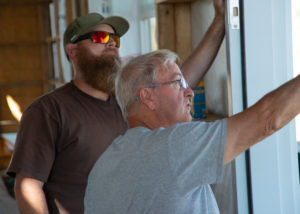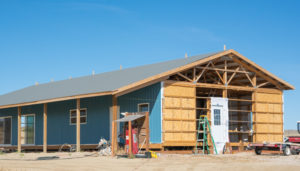EL PASO COUNTY–At Tuesday’s meeting El Paso County Commissioners denied Lonnie Cole’s request for a second extension of a permit to live in a travel trailer on his property while he builds his house. Commissioners voted unanimously to deny the extension.
Cole, 68, and Pat, his wife of 48 years moved from Tucson, Arizona to Colorado in 2017 after retiring from his job as an electrical engineer at the National Solar Observatory to be near his children and grandchildren.
Cole purchased a 13.4-acre lot east of Fountain in a 5-acre rural residential (RR-5) zoning district with the intent to build a house. On a limited budget, Cole could not afford to have a contractor build the house he envisioned so he resolved to build it himself, with some limited assistance from family and friends.

He got the appropriate permits from the County and the Regional Building Department and installed a septic system, a well and electric service before beginning construction.
In order to save money, Cole and Pat decided to live in their travel trailer on the property. Cole asked for and received a required permit to use an RV as temporary housing during construction from the county land use department. The permit was valid for one year.
Cole said he has been working diligently on the house as much as he is able, and when the permit expired he asked for an extension and the County granted him another six months. He slipped up and forgot to apply for another extension at the end of that term. When county code enforcement staff notified him he was in violation he immediately applied again.
But his request for a second 6-month extension was denied. A determination by the county Land Use and Planning Department claimed he had not made “substantial progress” in completing the home, a condition of the permit. Cole appealed to the Commissioners and was denied another residency permit.
At the hearing Cole asked why. Commissioners responded that they needed to abide by the “rule of law.”
Some Commissioners admitted this was a difficult issue for them, but ultimate decided to deny the permit, giving Cole three months to move to other accommodations.
Because outdoor RV storage is not permitted in the RR-5 zone, Cole will have to move the trailer and won’t be able to use it for rest and toilet facilities while working on the house.
Cole told Complete Colorado in an interview Thursday this will be a hardship, as he and his wife will have to rent a house or apartment or move the trailer to an RV park, all of which will likely cost at least $1,000 per month, or put the trailer in storage, money that will come out of the budget for his home.
The space needs for young people and older, retired people are substantially different from those of growing families.
“Adults living alone now account for nearly 30 percent of American households,” says the AARP in its report Making Room, Housing for a Changing America. “Deeply rooted zoning regulations that have long favored the standard single-family home make it difficult for alternatives to materialize.”
But in 2017, El Paso County, recognizing the skyrocketing cost of housing disproportionately affects both young and old, stepped to the cutting edge of this issue by amending zoning codes to permit the use of tiny homes and recreational vehicles (RVs) as long-term residences.
Recreational Vehicle Park (RVP) zoning districts were created and time limits on living in RVs in those districts were removed.
Tiny houses have to meet the same national construction standards as RVs or be certified by a professional structural engineer. They are allowed in any zoning district that permits the use of a mobile home, which includes in Cole’s case, the RR-5 district his property is in. But RVs are not permitted in that district.
One condition for tiny homes is that they cannot have either water or sewage storage and must be hooked up to utilities just as a larger house would.
Another condition is that the exterior of a tiny house must “Be finished on all sides with finished wood panel siding, vinyl siding, brick or stone veneer siding, stucco finish siding, other architecturally finished veneer, or with other types of siding as approved by the PCD Director.”
In other words, a tiny home has to have the same aesthetics as a normal house and can’t have water or sewer tanks.
Recreational vehicles like Cole’s trailer have water and sewer tanks, but Cole’s trailer is connected to approved septic, water and electrical systems just as it would be in a RPV zoning district where its use as a residence is allowed on a long-term basis.

That, and the fact that their trailer doesn’t look like a normal house, appear to be the only differences between a legal tiny home primary residence and his trailer, which is being used temporarily while he constructs his home.
Cole said he has not heard any complaints from his neighbors about his trailer.
Cole is upset that he tried to do the right thing by applying for a temporary residence permit and that the determination by the County that he has not made substantial progress is untrue.
Cole said, “What threat to public health, safety or welfare does my trailer pose? I just want to stay on site until I can get a certificate of occupancy to move into the house.”
Cole thinks it unreasonable to deny him permission based on an arbitrary determination of “no substantial progress” in completing his home. “We’re putting the siding on now,” he told Commissioners at the hearing. “But they are 30-foot steel panels and it’s difficult to handle them when the wind blows.”
Cole told Commissioners he expects to be able to move in within six months, but Commissioners voted to give him only three months to find somewhere else to live.


